Science & Environment
PayPal CEO Alex Chriss first year praised by Wall Street, stock pop Q3
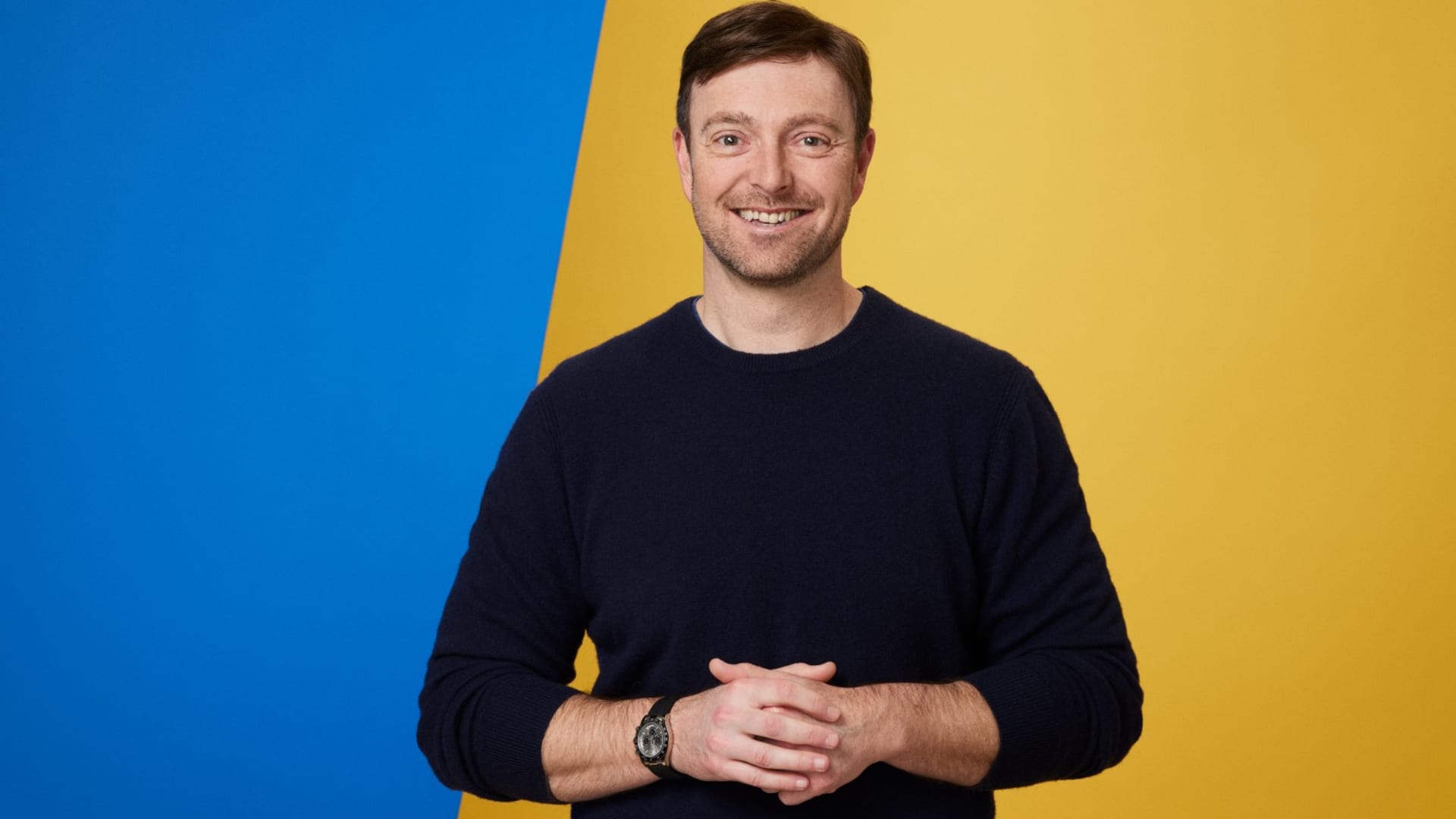
Alex Chriss, CEO of PayPal Inc.
Courtesy: PayPal
In January, about a hundred days into his job as PayPal CEO, Alex Chriss told CNBC’s David Faber that the payments company hadn’t had much to celebrate in recent years. But Chriss confidently said he was prepared to “shock the world.”
“I love being an underdog,” Chriss said in an interview on “Squawk on the Street,” from the floor of the New York Stock Exchange. He was responding to a question about a recent spate of analyst downgrades.
Dan Dolev of Mizuho Securities was among the skeptics. He cut his rating to the equivalent of a hold on Jan. 16, the day before Chriss’ CNBC appearance, headlining his report, “PayPal faces competitive pressure from ‘A’ to ‘Z.’” The A was for Apple Pay, and the Z represented payments app Zelle, a money transfer service jointly owned by seven of the top U.S. banks.
A few weeks later, PayPal issued weak guidance in its fourth-quarter earnings report, knocking the stock down 11% and justifying Dolev’s concerns.
PayPal appeared to be in deep trouble. Its market cap was down more than 80% since peaking in mid-2021. The company had just cut 9% of it workforce, about 2,500 jobs, and was mired in single-digit growth. Analysts across Wall Street saw rising competition and a declining take rate, or the percentage of revenue PayPal keeps from each transaction.
Fast forward to today, and the picture is dramatically brighter for the 26-year-old Silicon Valley company and its 47-year-old CEO.
Chriss hit his one-year anniversary at the helm on Friday. In the third quarter, which ended on Monday, PayPal shares jumped 34%, their biggest quarterly rally since mid-2020, when the early days of the Covid pandemic fueled a surge in online shopping. It was the first time in eight quarters that PayPal outperformed the Nasdaq, which gained just 2.6% in the past three months.

Dolev bolstered his rating back to a buy in May. In July, the company lifted its full-year profit forecast for a second time and increased share repurchases. Chriss said in the earnings release that the company was now “operating from a position of strength.” The stock rose almost 9%, its best day since late 2022.
“I think he’s been nothing but a phenomenal success story so far,” Dolev said. “The news flow has been out of this world amazing, in terms of the way they manage expectations.”
Susquehanna’s James Friedman lifted his rating on PayPal to a buy in early July. He said Chriss was “setting the bar high” with his comments on CNBC, but said he’s been delivering on his bold promise to shareholders.
“You know how he shocked the world?” Friedman said. “He actually beat his numbers.”
Much of Chriss’ early success has been tied to improved transaction margins and better monetization of key acquisitions like Braintree, which is used by Meta for credit card processing, and payments app Venmo, which is becoming more popular with businesses.
Having cut a lot of the fat in the organization and with a renewed focus on profitability, Chriss has finally sparked some excitement on Wall Street after replacing Dan Schulman, who retired following almost a decade as CEO.
“It was time for some new blood at PayPal,” said Dana Stalder, a startup investor at venture firm Matrix Partners who served as PayPal’s commercial chief from 2004 to 2008. “He’s made a lot of changes very quickly, and I think he has substantially increased the focus on the consumer, which is the right thing.”
‘Wholesale changes’ in leadership
Now comes the harder part — reigniting growth.
Analysts are projecting roughly 6% revenue growth when PayPal reports third-quarter results in about a month, according to LSEG. For the fourth quarter, they expect growth of 5.5%. Sales are only expected to get marginally stronger in 2024, with analysts expecting growth of under 8% for the full year.
PayPal didn’t make Chriss available for an interview for this story.
In the July earnings call, Chriss said of the firm’s next steps that “while change takes time and we still have much work ahead of us, we are well positioned today, have the right leadership in place and are moving full steam ahead.”
Chriss, who spent 19 years at tax software provider Intuit prior to joining PayPal, took little time before he started overhauling the management team. In November, he brought in Isabel Cruz from Walmart as chief people officer, Michelle Gill from Intuit to run a new small business and financial services group, Diego Scotti from Verizon to oversee the consumer group as well as marketing and communications, and Jamie Miller from EY as CFO.
“He has turned over, from what I can tell, the vast majority of the leadership team,” Stalder said. “It’s been wholesale changes.”
Early in his tenure, Chriss publicly identified some of the reasons, in his view, that PayPal had been struggling to find its footing. He highlighted an overly aggressive strategy of expansion through deal making.
“We have done too many acquisitions over the last few years, and we’ve been defocused,” Chriss said in the January interview with Faber. “It was one of the things I noticed when I came in 100 days ago.”
Chriss added that the company had narrowed down its priorities to five key things, “all focused on profitable growth.”
The most important metric to fix, he said, was transaction margin dollars, which is how the company gauges the profitability of its core business. Among Chriss’ strategies to address the deteriorating margin was to offer merchants increased value-added services, such as connecting a couple of data points at checkout to drive down the rate of cart abandonment.
He said in January that 35 million merchants use PayPal and “when we improve their conversion rate, it improves their business, it improves our bottom line.”
PayPal noted to shareholders in its latest earnings report that its branded checkout, along with Braintree and Venmo, helped the company achieve its highest growth rate in transaction margin dollars since 2021. Overall transaction margin dollars increased 8% to $3.6 billion.
Susquehanna’s Friedman says a career at Intuit is the perfect training ground for learning how to mastermind a stock recovery. Speaking to executives there is like “talking to a dashboard,” he said.
“The source code to engineer a higher stock is profitability,” Friedman said. Chriss “really boils down his management style to the things that count” and “reducing what’s irrelevant,” he added.
With Venmo, the goal is to turn one of the most popular choices for money transfer from a strictly consumer app, which has no transaction fees, to a product for merchants. DoorDash, Starbucks and Ticketmaster are among businesses now accepting Venmo as one way that consumers can pay.
Singing at the gas pump
Getting competitive at the point-of-sale is another big priority. That’s led PayPal to Will Ferrell.
The company launched a national campaign last month for PayPal Everywhere, offering 5% cash back for using a PayPal debit card within the mobile app. Ferrell, the pitchman, can be seen in a commercial using the PayPal app to buy lemonade and gas, while singing a parody of Fleetwood Mac’s “Everywhere.”
Stalder says PayPal is way behind Apple and Google, which own the dominant smartphone operating systems with their own embedded digital wallets.
“PayPal has been stuck because it’s less convenient than the mobile wallets, number one,” Stalder said. “And number two, it hasn’t worked offline.”
But Stalder sees a real opportunity for PayPal, in part because Apple has just opened the Secure Element on iOS so that other developers can more easily use the phone for contactless payments, putting them on a more equal plane with Apple Pay.
That development allows PayPal to “ride the mobile wallet rails for the first time and make some real headway in offline payments,” Stalder said.
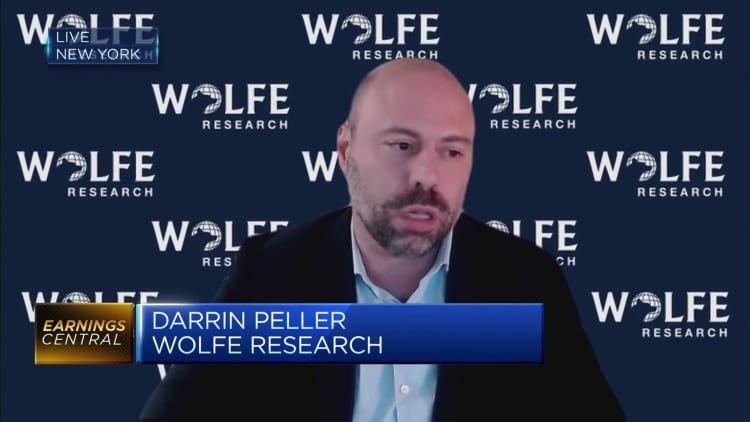
PayPal’s other point-of-sale effort is called Fastlane, a one-click payment option for online sales that can go head-to-head with Apple Pay and Shop Pay by Shopify. In August, fintech platform Adyen made Fastlane available to businesses in the U.S., and said it plans to expand the offering globally in the future.
Chriss told investors on the earnings call that the company is urgently pushing to meet the holiday rush.
“We need to get it on as many platforms as we can so that small businesses in particular can just one-click a button and turn it on for the holidays,” Chriss said. “We’re working with many of our large enterprises who want access to this before the holidays as well.”
‘No drama’
Chriss’ long history at Intuit gave him an intimate understanding of the expansive world of small- and medium-sized businesses. That experience could be crucial as PayPal targets SMBs with its various payment and checkout options.
Sanjay Sakhrani, an analyst at KBW, said going further down market allows PayPal to command better economics because there’s so much more competition when going after enterprises.
“To the extent that they can broaden their reach there, I think that could be quite lucrative,” said Sakhrani, who has a buy rating on the stock.
Chriss calls SMBs an “untapped opportunity for us,” adding on the earnings call that those companies don’t want to “piece together 17 different solutions.”
“Small businesses are – they’re fighting for every customer,” Chriss said in July. “They need to be able to find customers. They need to be able to engage with customers, convert them, and then reengage with them.”
Venture capitalist Oren Zeev has seen Chriss work with small businesses in another capacity. They served together on the board of home design startup Houzz, whose customers include a lot of architects and contractors.
“He obviously brought a lot to the table with his vast experience with small businesses,” Zeev said. As a communicator, Zeev described Chriss as “no drama” and “respected by everyone.”
While he’s quickly captured the respect of investors, who have lifted PayPal’s market cap by over $20 billion in the year since Chriss started, there’s a lot more to do.
The stock remains about 75% below its record high. Sakhrani says shareholders are “anxiously awaiting his multiple-year outlook” as opposed to just “trying to fix some of the stuff that was broken.”
“There’s going to be some pressure at some point in time, in the near future, for more definition around that,” Sakhrani said.
Chriss, for his part, isn’t declaring victory.
“Our teams are moving with urgency, excited about our innovation and focused on execution,” he said on the second-quarter earnings call. “We are still early in our transformation and while pleased with our progress in many areas, we know there is much more we can do and with greater speed.”
WATCH: PayPal’s crypto lead on allowing merchants to buy and sell virtual assets

Science & Environment
WTI drifts lower amid widening war in Middle East
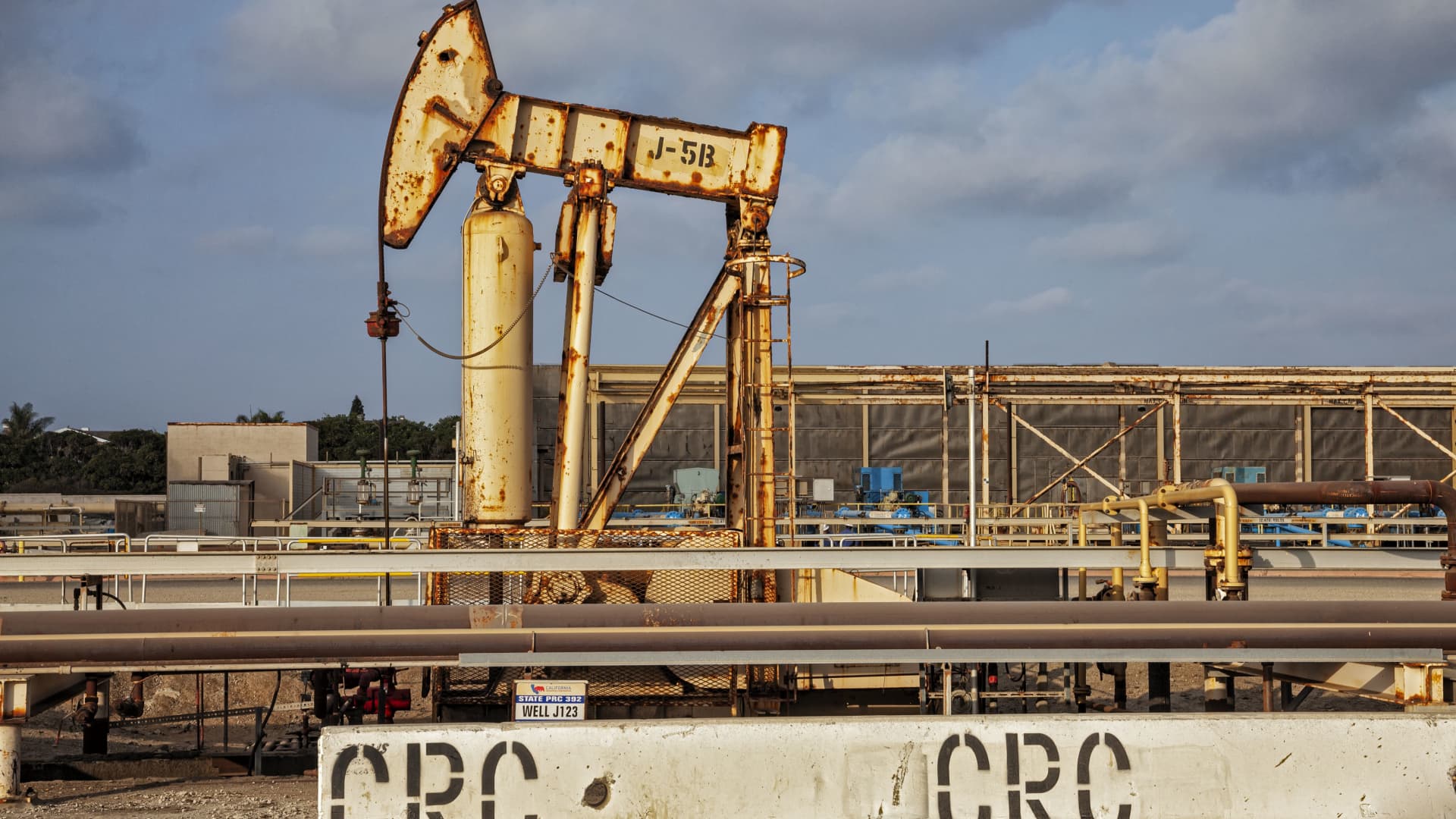

U.S. crude oil prices drifted lower Tuesday as the risk of rising supply from OPEC+ overshadows a dramatic escalation of the war in the Middle East.
Israel has dispatched ground forces into southern Lebanon after pounding the Iran-backed militia Hezbollah with airstrikes for days, eliminating much of the group’s leadership.
“We have two wars going on at the moment, we’ve had a massive racheting up of tensions in the Middle East and yet oil to date has not been affected by either conflict in a material way,” Helima Croft, head of global commodity strategy at RBC Capital Markets, told CNBC’s “Money Movers.”
For now, traders remain focused on weak demand in China and the prospect of OPEC+ producing more oil starting in December, Croft said.
Here are Tuesday’s energy prices at 8:43 am ET:
- West Texas Intermediate November contract: $67.33 per barrel, down 85 cents, or 1.25%. Year to date, U.S. crude oil has fallen 6%.
- Brent January contract: $70.58 per barrel, down 88 cents, or 0.88%. Year to date, the global benchmark has dropped more than 8%.
- RBOB Gasoline November contract: $1.8973 per gallon, down 0.03%. Year to date, gasoline has pulled back nearly 10%.
- Natural Gas November contract: $2.870 per thousand cubic feet, down 1.81%. Year to date, gas has gained 14%.
OPEC leader Saudi Arabia might be prepared to allow more oil back onto the market to pressure members such as Iraq with lower oil prices, said Bob McNally, president of Rapidan Energy. Saudi has become increasingly frustrated with Iraq producing more crude than then their production targets, McNally said.

“There are good odds that OPEC+ leadership will sweat the producers,” McNally told CNBC’s “Street Signs.” “Every once in a while, it seems, there has to be a price drop to remind members of OPEC+ that they have an obligation to participate in collective supply management.”
This would push Brent prices down toward $60 per barrel, or below in 2025, McNally said.
“Our base case is they will go higher, but that is the risk, that we would be into the 60s with surpluses next year and that would be tolerated as sort of a temporary corrective action to get Iraq to come into compliance,” McNally said.
Science & Environment
Abu Dhabi’s ADNOC to buy Covestro for $16.4 billion
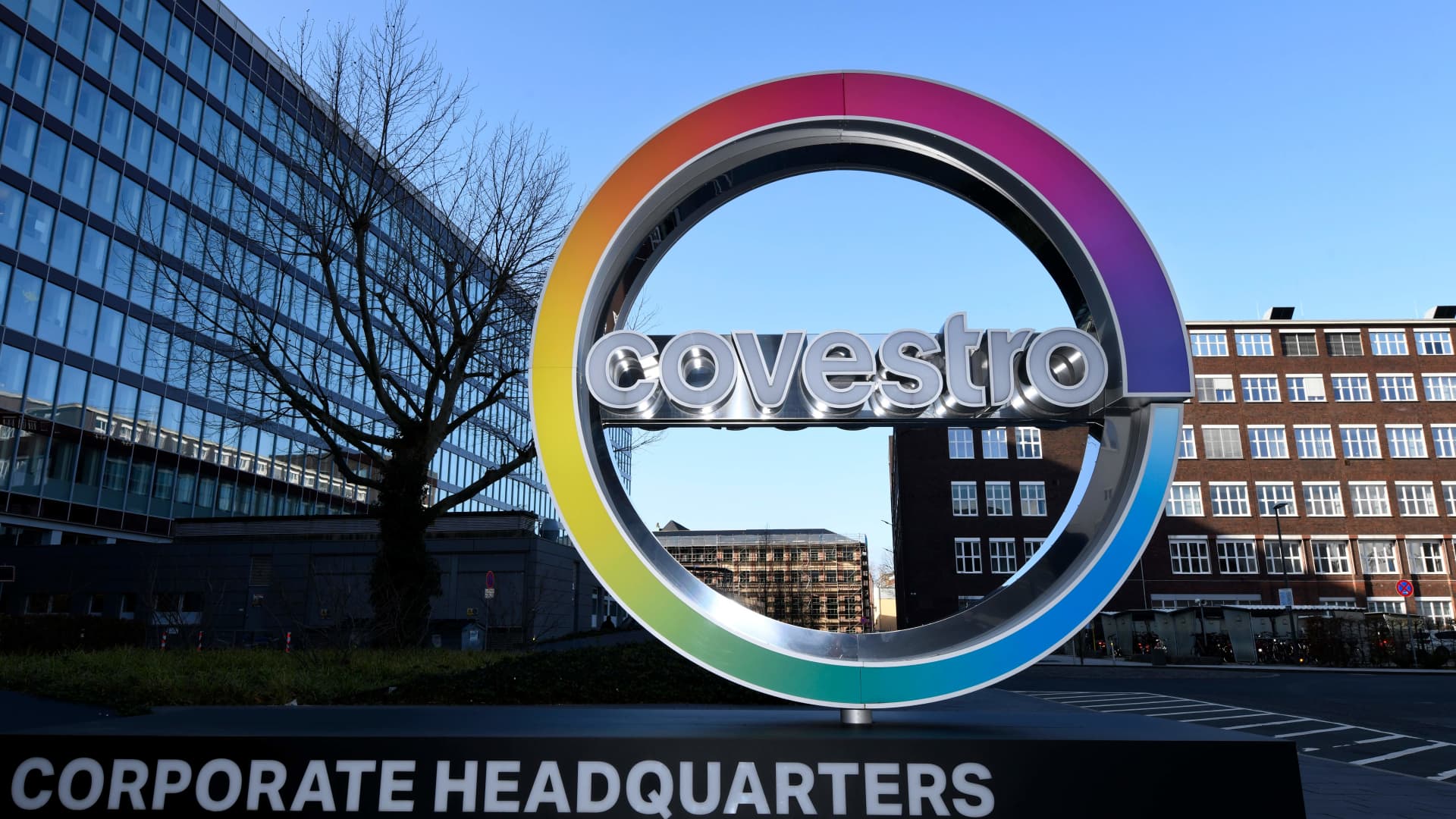
Covestro’s headquarters in Leverkusen, Germany. The company has adjusted its full year guidance for 2022, citing a number of factors.
Ina Fassbender | AFP | Getty Images
Abu Dhabi’s state-owned oil firm ADNOC on Tuesday said it has agreed to buy German chemicals firm Covestro for 14.7 billion euros ($16.4 billion).
ADNOC will launch a 62 euros-per-share voluntary public takeover that implies an equity value for Covestro of around 11.7 billion euros and represents a premium of around 54% to Covestro’s closing price on June 19, Covestro said in a statement.
The deal represents an enterprise value of 14.7 billion euros, ADNOC said in a separate statement. It added that the transaction is key for the firm’s international growth strategy of becoming a top-five chemicals player.
“As a global leader and industrial pioneer in chemicals, Covestro brings unmatched expertise in high-tech specialty chemicals and materials, using advanced technologies including AI,” said Sultan Ahmed al-Jaber, group CEO and managing director of ADNOC.
Covestro, a former unit of Bayer, said that its management and supervisory board assume they will recommend the transaction to the firm’s shareholders, subject to an offer review.
Analysts at Jefferies said in a Tuesday note that they expect limited antitrust and regulatory risk from the deal, given the “limited operational overlap.”
This is a breaking news story. Please refresh for updates.
Science & Environment
Markets just had an expectations-defying month
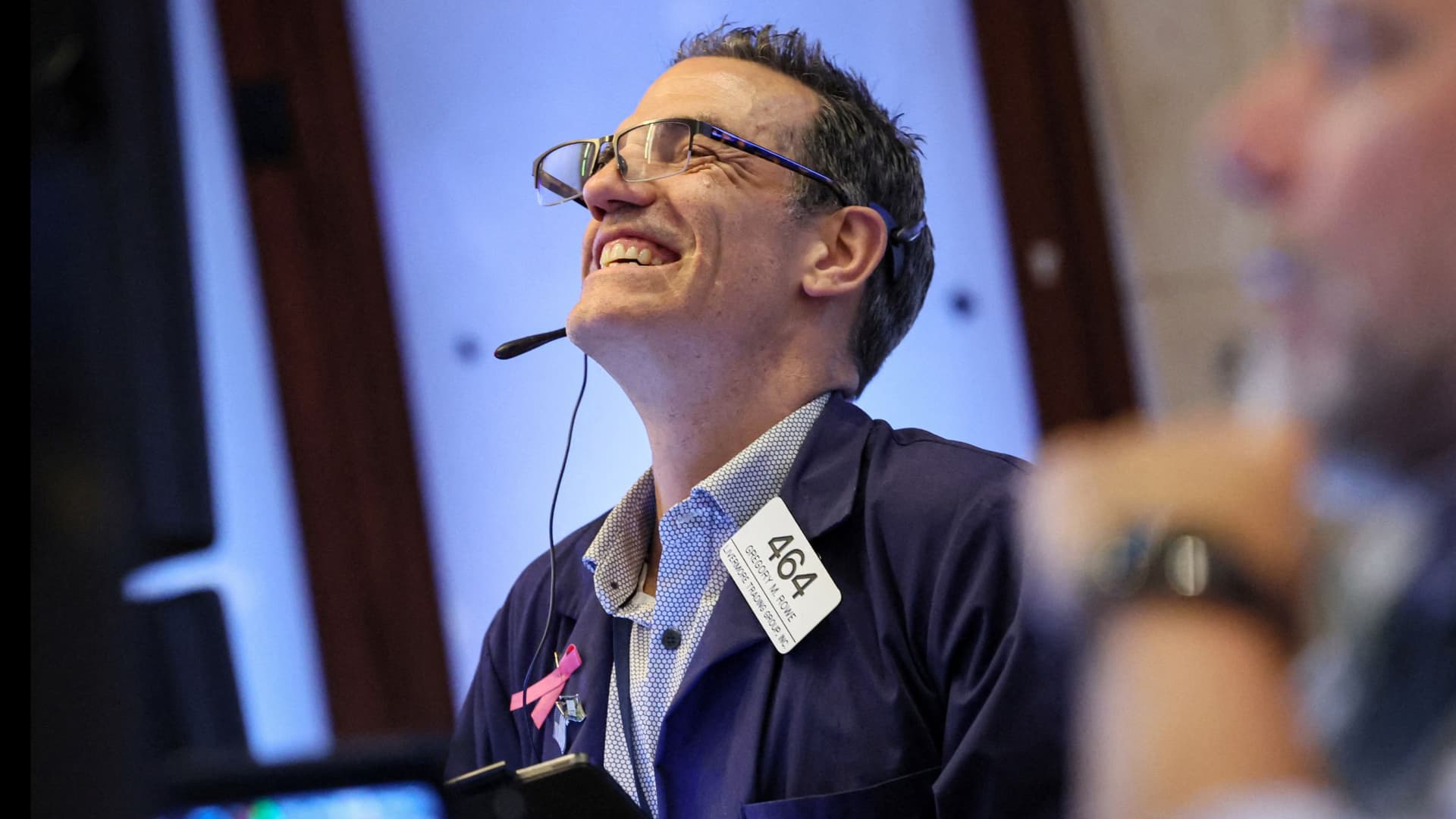
Traders work on the floor of the New York Stock Exchange on June 14, 2024.
Brendan Mcdermid | Reuters
This report is from today’s CNBC Daily Open, our international markets newsletter. CNBC Daily Open brings investors up to speed on everything they need to know, no matter where they are. Like what you see? You can subscribe here.
What you need to know today
The bottom line
The S&P 500 has fallen at least 4% in the last four Septembers. But the index charted a new trajectory this year to cap off a winning month and quarter.
On Monday, the S&P rose 0.42% to close at a record level of 5,762.48. The Dow Jones Industrial Average was near the flatline, and the Nasdaq Composite climbed 0.38%.
That gives the S&P a gain of around 2% for the month, its first September in the green since 2019. For the month, the Dow advanced 1.9% and the Nasdaq rose 2.7%.
All indexes marked quarterly gains as well, despite the sell-off in the beginning of August.
Notably, the Russell 2000, which comprises the 2,000 smallest stocks in the Russell Index, advanced 8.9% for the quarter. That outstrips the quarterly increase of S&P, Dow and Nasdaq, which added 5.5%, 8.2% and 2.6% respectively.
Small-cap stocks tend to benefit from lower rates because they are more exposed to general economic conditions like the cost of debt and consumer sentiment. The Russell 2000 outperforming major indexes could be seen as a sign that the Fed’s latest rate cut has begun affecting the markets.
The performance of S&P sectors this quarter is another indication of how the rate cut is changing investors’ behavior. While information technology and communications services have been the best performing sectors year to date, they were laggards this past quarter, gaining only about 1.4%.
By contrast, utilities jumped 18.5% and real estate climbed 16.3% for the quarter. Both sectors generally provide dividends to investors, which become more attractive as fixed income yields fall in tandem with lower rates. Cheaper borrowing costs also have a disproportionate effect on utilities and real estate because those sectors require huge initial investments.
With Powell saying monetary policy “will move over time toward a more neutral stance,” the market rally has the potential to broaden further as more rate cuts take place.
– CNBC’s Robert Hum, Lisa Kailai Han, Alex Harring and Hakyung Kim contributed to this story.
Science & Environment
Disney lands an upgrade — plus, why we’re considering adding to this laggard stock

Every weekday, the CNBC Investing Club with Jim Cramer releases the Homestretch — an actionable afternoon update, just in time for the last hour of trading on Wall Street.
Science & Environment
ISS welcomes crew of docked SpaceX capsule
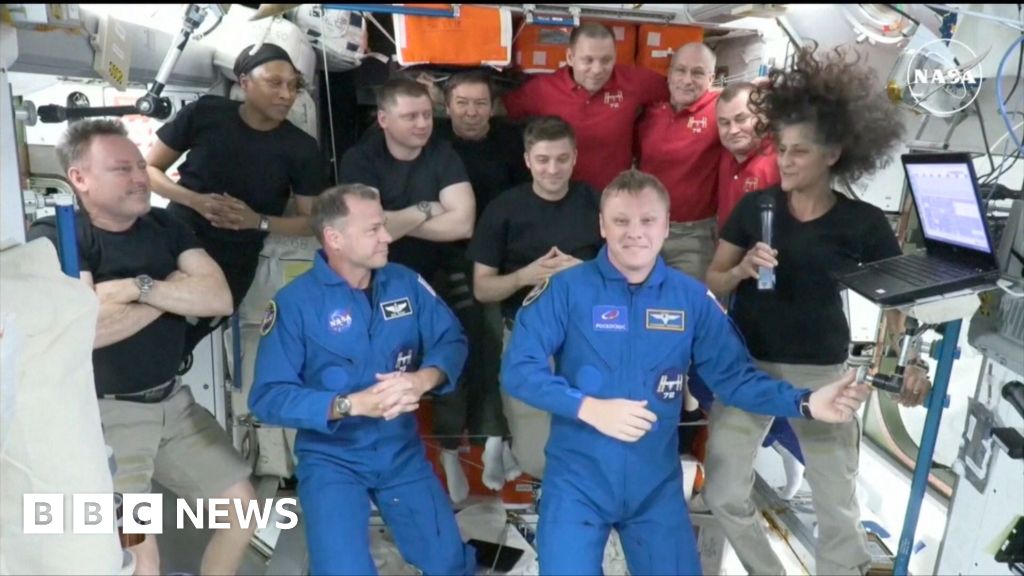
A SpaceX capsule sent to bring back two astronauts stranded on the International Space Station (ISS) has docked.
The Dragon capsule has two empty seats for Butch Wilmore and Suni Williams, who were only meant to be on the ISS for eight days, but were forced to remain there because of a fault discovered during the flight. The pair are now expected to return to Earth in February.
The Dragon capsule lifted off from Cape Canaveral, Florida on Saturday carrying Nasa astronaut Nick Hague and Russian cosmonaut Alexander Gorbunov.
Science & Environment
FTC clears Chevron-Hess deal, bans John Hess from board
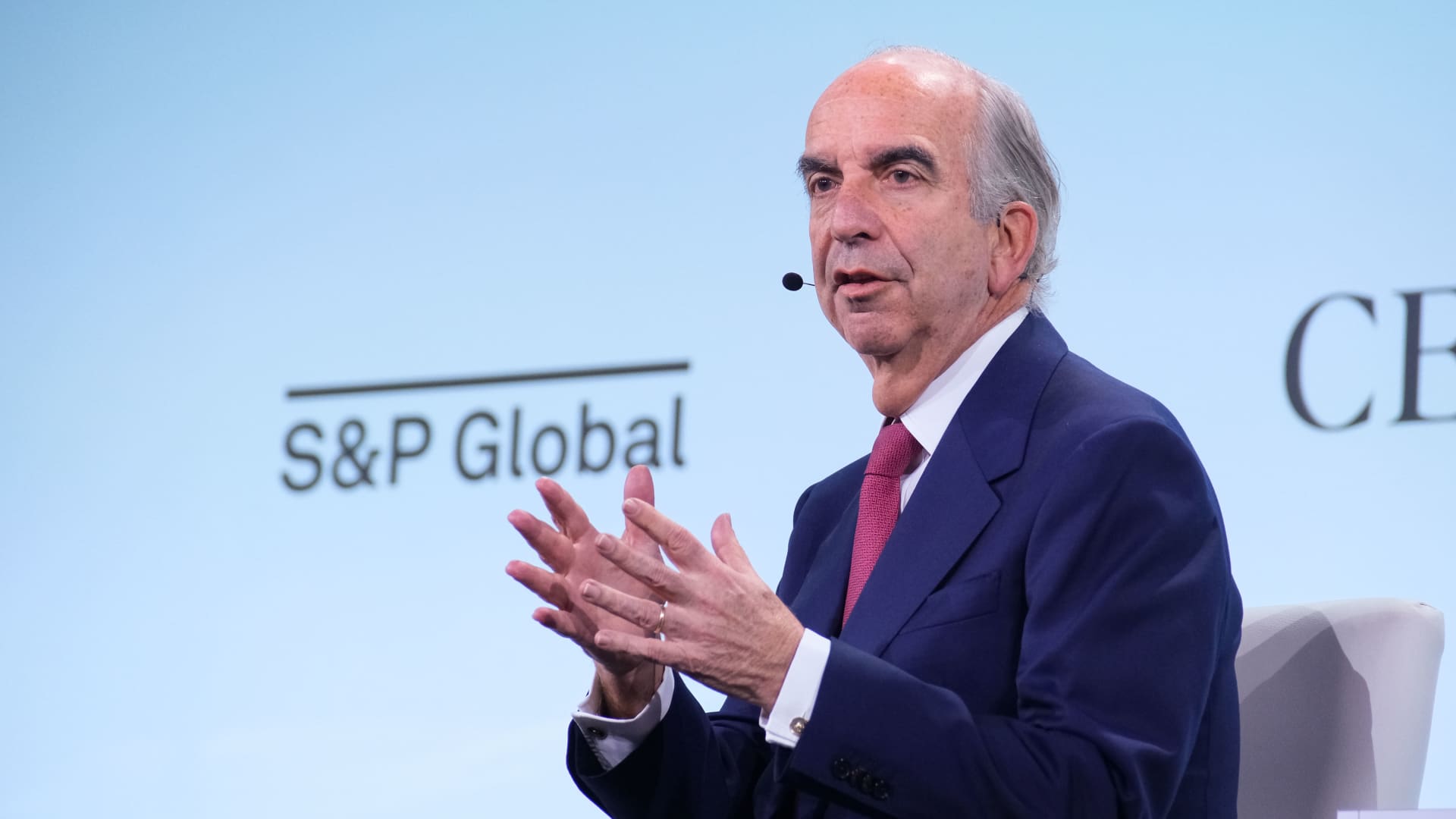
John Hess, chief executive officer of Hess Corp., speaks at the 2024 CERAWeek by S&P Global conference in Houston, Texas, US, on Tuesday, March 19, 2024.
F. Carter Smith | Bloomberg | Getty Images
The Federal Trade Commission has banned Hess Corp. CEO John Hess from Chevron‘s board as a condition for the oil companies’ $53 billion merger to move forward.
The FTC on Monday alleged that Hess encouraged OPEC representatives to draw down inventories, which would result in higher oil prices.
“Mr. Hess’s communications with competitors about global oil output and other dimensions of crude oil market competition disqualify him from serving on Chevron’s Board of Directors,” Henry Liu, director of the FTC’s Bureau of Competition, said in a statement Monday.
Hess said the FTC concerns are without merit, describing the CEO’s communications with OPEC as consistent with statements he has made to the U.S. government.
Hess Corp. and Chevron, however, have agreed that they will not appoint Hess to the board in order to facilitate the completion of the merger, according to the companies. Hess will serve as an advisor to Chevron on government relations and “social investments” in Guyana.
The FTC’s decision to allow the deal leaves the companies’ dispute with Exxon Mobil as the final hurdle for the transaction to close. Exxon has filed claims with an arbitration panel claiming a right of first refusal over Hess’ lucrative oil assets in Guyana.
If the arbitration panel rules in Exxon’s favor, the Chevron-Hess deal will not close. Chevron and Hess have said they are confident that panel will rule in their favor.
This is a developing story. Please check back for updates.
-

 Womens Workouts1 week ago
Womens Workouts1 week ago3 Day Full Body Women’s Dumbbell Only Workout
-

 Technology2 weeks ago
Technology2 weeks agoWould-be reality TV contestants ‘not looking real’
-

 Science & Environment2 weeks ago
Science & Environment2 weeks agoHyperelastic gel is one of the stretchiest materials known to science
-

 Science & Environment2 weeks ago
Science & Environment2 weeks agoHow to wrap your mind around the real multiverse
-

 Science & Environment2 weeks ago
Science & Environment2 weeks ago‘Running of the bulls’ festival crowds move like charged particles
-

 News1 week ago
News1 week agoOur millionaire neighbour blocks us from using public footpath & screams at us in street.. it’s like living in a WARZONE – WordupNews
-

 Science & Environment2 weeks ago
Science & Environment2 weeks agoHow to unsnarl a tangle of threads, according to physics
-

 Science & Environment2 weeks ago
Science & Environment2 weeks agoMaxwell’s demon charges quantum batteries inside of a quantum computer
-

 Science & Environment2 weeks ago
Science & Environment2 weeks agoSunlight-trapping device can generate temperatures over 1000°C
-

 Science & Environment2 weeks ago
Science & Environment2 weeks agoITER: Is the world’s biggest fusion experiment dead after new delay to 2035?
-

 Science & Environment2 weeks ago
Science & Environment2 weeks agoLiquid crystals could improve quantum communication devices
-

 Science & Environment2 weeks ago
Science & Environment2 weeks agoPhysicists are grappling with their own reproducibility crisis
-

 Science & Environment2 weeks ago
Science & Environment2 weeks agoQuantum ‘supersolid’ matter stirred using magnets
-

 News2 weeks ago
News2 weeks agoYou’re a Hypocrite, And So Am I
-

 Science & Environment2 weeks ago
Science & Environment2 weeks agoQuantum forces used to automatically assemble tiny device
-

 Sport2 weeks ago
Sport2 weeks agoJoshua vs Dubois: Chris Eubank Jr says ‘AJ’ could beat Tyson Fury and any other heavyweight in the world
-

 Science & Environment2 weeks ago
Science & Environment2 weeks agoWhy this is a golden age for life to thrive across the universe
-

 Science & Environment2 weeks ago
Science & Environment2 weeks agoNuclear fusion experiment overcomes two key operating hurdles
-

 Science & Environment2 weeks ago
Science & Environment2 weeks agoCaroline Ellison aims to duck prison sentence for role in FTX collapse
-

 Science & Environment2 weeks ago
Science & Environment2 weeks agoTime travel sci-fi novel is a rip-roaringly good thought experiment
-

 Science & Environment2 weeks ago
Science & Environment2 weeks agoLaser helps turn an electron into a coil of mass and charge
-

 Science & Environment2 weeks ago
Science & Environment2 weeks agoNerve fibres in the brain could generate quantum entanglement
-

 News2 weeks ago
News2 weeks agoIsrael strikes Lebanese targets as Hizbollah chief warns of ‘red lines’ crossed
-

 CryptoCurrency2 weeks ago
CryptoCurrency2 weeks agoCardano founder to meet Argentina president Javier Milei
-

 Science & Environment1 week ago
Science & Environment1 week agoMeet the world's first female male model | 7.30
-

 Womens Workouts1 week ago
Womens Workouts1 week agoBest Exercises if You Want to Build a Great Physique
-

 Science & Environment2 weeks ago
Science & Environment2 weeks agoWhy we need to invoke philosophy to judge bizarre concepts in science
-

 CryptoCurrency2 weeks ago
CryptoCurrency2 weeks agoBitcoin miners steamrolled after electricity thefts, exchange ‘closure’ scam: Asia Express
-

 CryptoCurrency2 weeks ago
CryptoCurrency2 weeks agoDZ Bank partners with Boerse Stuttgart for crypto trading
-

 CryptoCurrency2 weeks ago
CryptoCurrency2 weeks agoEthereum is a 'contrarian bet' into 2025, says Bitwise exec
-

 Womens Workouts1 week ago
Womens Workouts1 week agoEverything a Beginner Needs to Know About Squatting
-

 News1 week ago
News1 week agoFour dead & 18 injured in horror mass shooting with victims ‘caught in crossfire’ as cops hunt multiple gunmen
-

 Womens Workouts1 week ago
Womens Workouts1 week ago3 Day Full Body Toning Workout for Women
-

 Science & Environment2 weeks ago
Science & Environment2 weeks agoA slight curve helps rocks make the biggest splash
-

 News2 weeks ago
News2 weeks ago▶️ Media Bias: How They Spin Attack on Hezbollah and Ignore the Reality
-

 Science & Environment2 weeks ago
Science & Environment2 weeks agoQuantum time travel: The experiment to ‘send a particle into the past’
-

 CryptoCurrency2 weeks ago
CryptoCurrency2 weeks agoDorsey’s ‘marketplace of algorithms’ could fix social media… so why hasn’t it?
-

 CryptoCurrency2 weeks ago
CryptoCurrency2 weeks agoRedStone integrates first oracle price feeds on TON blockchain
-

 CryptoCurrency2 weeks ago
CryptoCurrency2 weeks agoBitcoin bulls target $64K BTC price hurdle as US stocks eye new record
-

 CryptoCurrency2 weeks ago
CryptoCurrency2 weeks agoLow users, sex predators kill Korean metaverses, 3AC sues Terra: Asia Express
-

 Sport2 weeks ago
Sport2 weeks agoUFC Edmonton fight card revealed, including Brandon Moreno vs. Amir Albazi headliner
-

 CryptoCurrency2 weeks ago
CryptoCurrency2 weeks agoBlockdaemon mulls 2026 IPO: Report
-

 News2 weeks ago
News2 weeks agoBrian Tyree Henry on voicing young Megatron, his love for villain roles
-

 CryptoCurrency2 weeks ago
CryptoCurrency2 weeks agoCoinbase’s cbBTC surges to third-largest wrapped BTC token in just one week
-

 Travel1 week ago
Travel1 week agoDelta signs codeshare agreement with SAS
-

 Politics6 days ago
Politics6 days agoHope, finally? Keir Starmer’s first conference in power – podcast | News
-

 Science & Environment2 weeks ago
Science & Environment2 weeks agoBeing in two places at once could make a quantum battery charge faster
-

 Science & Environment2 weeks ago
Science & Environment2 weeks agoA new kind of experiment at the Large Hadron Collider could unravel quantum reality
-

 Science & Environment2 weeks ago
Science & Environment2 weeks agoHow one theory ties together everything we know about the universe
-

 Science & Environment2 weeks ago
Science & Environment2 weeks agoFuture of fusion: How the UK’s JET reactor paved the way for ITER
-

 Science & Environment2 weeks ago
Science & Environment2 weeks agoHow do you recycle a nuclear fusion reactor? We’re about to find out
-

 Science & Environment2 weeks ago
Science & Environment2 weeks agoTiny magnet could help measure gravity on the quantum scale
-

 CryptoCurrency2 weeks ago
CryptoCurrency2 weeks agoCrypto scammers orchestrate massive hack on X but barely made $8K
-

 CryptoCurrency2 weeks ago
CryptoCurrency2 weeks ago‘No matter how bad it gets, there’s a lot going on with NFTs’: 24 Hours of Art, NFT Creator
-

 CryptoCurrency2 weeks ago
CryptoCurrency2 weeks agoSEC asks court for four months to produce documents for Coinbase
-
Business2 weeks ago
How Labour donor’s largesse tarnished government’s squeaky clean image
-

 Technology2 weeks ago
Technology2 weeks agoiPhone 15 Pro Max Camera Review: Depth and Reach
-

 News2 weeks ago
News2 weeks agoBrian Tyree Henry on voicing young Megatron, his love for villain roles
-

 Womens Workouts2 weeks ago
Womens Workouts2 weeks agoHow Heat Affects Your Body During Exercise
-

 Womens Workouts2 weeks ago
Womens Workouts2 weeks agoKeep Your Goals on Track This Season
-

 Science & Environment2 weeks ago
Science & Environment2 weeks agoUK spurns European invitation to join ITER nuclear fusion project
-

 News2 weeks ago
News2 weeks agoChurch same-sex split affecting bishop appointments
-

 Technology2 weeks ago
Technology2 weeks agoFivetran targets data security by adding Hybrid Deployment
-

 CryptoCurrency2 weeks ago
CryptoCurrency2 weeks ago$12.1M fraud suspect with ‘new face’ arrested, crypto scam boiler rooms busted: Asia Express
-

 CryptoCurrency2 weeks ago
CryptoCurrency2 weeks agoDecentraland X account hacked, phishing scam targets MANA airdrop
-

 CryptoCurrency2 weeks ago
CryptoCurrency2 weeks agoCertiK Ventures discloses $45M investment plan to boost Web3
-

 CryptoCurrency2 weeks ago
CryptoCurrency2 weeks agoBeat crypto airdrop bots, Illuvium’s new features coming, PGA Tour Rise: Web3 Gamer
-

 CryptoCurrency2 weeks ago
CryptoCurrency2 weeks agoTelegram bot Banana Gun’s users drained of over $1.9M
-

 CryptoCurrency2 weeks ago
CryptoCurrency2 weeks agoVonMises bought 60 CryptoPunks in a month before the price spiked: NFT Collector
-

 CryptoCurrency2 weeks ago
CryptoCurrency2 weeks ago‘Silly’ to shade Ethereum, the ‘Microsoft of blockchains’ — Bitwise exec
-

 CryptoCurrency2 weeks ago
CryptoCurrency2 weeks agoEthereum falls to new 42-month low vs. Bitcoin — Bottom or more pain ahead?
-
Business2 weeks ago
Thames Water seeks extension on debt terms to avoid renationalisation
-
Politics2 weeks ago
‘Appalling’ rows over Sue Gray must stop, senior ministers say | Sue Gray
-

 Science & Environment1 week ago
Science & Environment1 week agoCNN TÜRK – 🔴 Canlı Yayın ᴴᴰ – Canlı TV izle
-

 News1 week ago
News1 week agoWhy Is Everyone Excited About These Smart Insoles?
-

 News5 days ago
News5 days agoUS Newspapers Diluting Democratic Discourse with Political Bias
-

 Politics2 weeks ago
Politics2 weeks agoTrump says he will meet with Indian Prime Minister Narendra Modi next week
-

 Technology2 weeks ago
Technology2 weeks agoCan technology fix the ‘broken’ concert ticketing system?
-

 Health & fitness2 weeks ago
Health & fitness2 weeks agoThe secret to a six pack – and how to keep your washboard abs in 2022
-

 Science & Environment2 weeks ago
Science & Environment2 weeks agoSingle atoms captured morphing into quantum waves in startling image
-

 Science & Environment2 weeks ago
Science & Environment2 weeks agoHow Peter Higgs revealed the forces that hold the universe together
-

 Science & Environment2 weeks ago
Science & Environment2 weeks agoA tale of two mysteries: ghostly neutrinos and the proton decay puzzle
-

 CryptoCurrency2 weeks ago
CryptoCurrency2 weeks ago2 auditors miss $27M Penpie flaw, Pythia’s ‘claim rewards’ bug: Crypto-Sec
-

 CryptoCurrency2 weeks ago
CryptoCurrency2 weeks agoLouisiana takes first crypto payment over Bitcoin Lightning
-

 CryptoCurrency2 weeks ago
CryptoCurrency2 weeks agoJourneys: Robby Yung on Animoca’s Web3 investments, TON and the Mocaverse
-

 CryptoCurrency2 weeks ago
CryptoCurrency2 weeks ago‘Everything feels like it’s going to shit’: Peter McCormack reveals new podcast
-

 CryptoCurrency2 weeks ago
CryptoCurrency2 weeks agoSEC sues ‘fake’ crypto exchanges in first action on pig butchering scams
-

 CryptoCurrency2 weeks ago
CryptoCurrency2 weeks agoBitcoin price hits $62.6K as Fed 'crisis' move sparks US stocks warning
-

 CryptoCurrency2 weeks ago
CryptoCurrency2 weeks agoVitalik tells Ethereum L2s ‘Stage 1 or GTFO’ — Who makes the cut?
-

 News2 weeks ago
News2 weeks agoBrian Tyree Henry on his love for playing villains ahead of “Transformers One” release
-

 Womens Workouts2 weeks ago
Womens Workouts2 weeks agoWhich Squat Load Position is Right For You?
-

 News1 week ago
News1 week agoBangladesh Holds the World Accountable to Secure Climate Justice
-

 TV1 week ago
TV1 week agoCNN TÜRK – 🔴 Canlı Yayın ᴴᴰ – Canlı TV izle
-

 Technology1 week ago
Technology1 week agoRobo-tuna reveals how foldable fins help the speedy fish manoeuvre
-

 Science & Environment6 days ago
Science & Environment6 days agoX-rays reveal half-billion-year-old insect ancestor
-

 Technology2 weeks ago
Technology2 weeks agoIs carbon capture an efficient way to tackle CO2?
-

 Health & fitness2 weeks ago
Health & fitness2 weeks agoThe maps that could hold the secret to curing cancer
-

 Science & Environment2 weeks ago
Science & Environment2 weeks agoThe physicist searching for quantum gravity in gravitational rainbows
-

 CryptoCurrency2 weeks ago
CryptoCurrency2 weeks agoHelp! My parents are addicted to Pi Network crypto tapper
-

 CryptoCurrency2 weeks ago
CryptoCurrency2 weeks agoCZ and Binance face new lawsuit, RFK Jr suspends campaign, and more: Hodler’s Digest Aug. 18 – 24

You must be logged in to post a comment Login